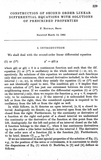Article
Full entry |
 PDF
(1.8 MB)
Feedback
PDF
(1.8 MB)
Feedback
 PDF
(1.8 MB)
Feedback
PDF
(1.8 MB)
Feedback
References:
[1] Barvínek E.: O rozložení nulových bodů řešení lineární diferenciální rovnice $y''=Q(t)$ a jejich derivací. Acta F.R.N. Univ. Comen. V. 8-10 Mat. (1961), p. 465-474. MR 0131615
[2] Borůvka O.: O кoлeблющиxcя интeгpaлax диффepeнциaльныx линeйных ypaвнeний 2-oгo пopядкa. Czech. Math. J., 3 (78), (1953), 199-251.
[3] Borůvka O.: Sur la transformation des intégrales des équations différentelles linéaires ordinaires du second ordre. Annali di Mat. pura ed appl., S. IV., T. XLI (1956), p. 325-342. MR 0095311
[4] Borůvka O.: Sur les transformation différentelles linéaires complètes du second ordre. Annali di Mat. pura ed appl., S. IV., T. XLIX (1960), p. 229-261. MR 0114962
[5] Borůvka O.: Sur ľensemble des équations différentialles linéaires du deuxième ordre qui ont la même dispersion fondamentale. Bulletin of the Polyt. Inst. Jassy IX (XIII), (1963), fasc. 3-4, p. 11-20. MR 0179407
[6] Chrastina J.: O splynutí centrálních dispersí 3. a 4. druhu diferenciální rovnice $y'' + Q(x) y= 0$. Čas. pro pěst. mat., 87 (1962), p. 188-197. MR 0142826
[7] Chrastina J.: K teorii dispersí rovnice $ÿ(t) + Q(t) y(t) = 0$. Publ. Fac. Sci. Univ. J. E. Purkyně, Brno 1964, No 454, (1964), p. 265-273. MR 0192112
[8] Kuczma M.: On the functional equation $\Phi (x) +\Phi [f(x)] = F(x)$. Annales Polonici matematici, VI, p. 281-287. MR 0107103
[9] Laitoch M.: Coвнaдeниe цeнтpaльныx диcпepcий 1-oгo и 2-oгo poдa cooтвeтcтвyющиx диффepeнциaльнoмy ypaвнeнию втopoгo пopндкa y" = Q(t) y. Czech. Math. J., T. 6 (81), (1956), p. 365-380. MR 0094504
[10] Neuman F.: Suг les équations difféгentielles linéaires du second oгdre dont les solutions ont des racines formant une suite convex. Acta Math. Hung. T. XIII, (1962), p. 281-287. MR 0148999
[11] Neuman F.: Sur les équations difféгentielles linéaiгes oscillatoires du deuxième ordгe avec la dispersion fondamentale $\varphi (t) = t +\pi$. Bulletin of the Polyt. Inst. of Jassy, X(XIV), (1964), fasc. 1-2, p. 37-42. MR 0197825
[12] Šeda V.: O niektorých vlastnostiach riešení difeгenciálnej rovnice $y"= Q(z) y$, $Q(z) \nequiv 0$ je celá funkcia. Acta Fac. R. N. Univ. Comen. T. IV. Math. (1959), p. 223-253.

